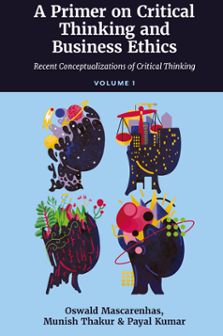Critical thinking
, 1–2, 4–6, 8, 10, 14, 16–17, 20, 34, 55, 188
advanced principles of critical thinking
, 25
as aesthetically rational design thinking
, 91–92
agenda for critical thinking investigation
, 19
to analyze belief systems
, 134
animal welfare and environmental ethics
, 29–30
applied to HRM
, 140
applying critical thinking concerns of Habermas and others to global efficiency, stability, and justice
, 61–62
applying definitions of critical thinking to organizational inputs, processes, and outcomes
, 57–60
applying definitions of Edward Glaser
, 64–68
approaches to teaching
, 7–8
behavioral component
, 14
beliefs, behavior, business
, 211–213
brief history of
, 41
building strengths and ignoring weaknesses
, 99–103
and business ethics
, 28
in business ethics
, 77–79
Cartesian dualism and
, 193
Cartesian systematic doubt as
, 51–52
Cartesian theory on fallibility of human knowledge
, 189–192
challenge of
, 17–18
changing way
, 103–106
characteristics and process of
, 52–56
as complex consciousness, self-organization, and emergence
, 33–37
core of
, 69
corporate fraudulent thinking
, 2–3
countering structured layers of our thinking and reasoning
, 21
critical need for
, 2
critical thinking–based education
, 108
current problems in management education
, 26–27
defensive routines as lack of
, 89–91
designing models of critical thinking based on history
, 43–44
designing models of critical thinking based on history from renaissance period to current times
, 48
desirable principles of
, 25
difference between thinking and
, 189
domain of
, 21–22
as ecofeminism to counter male dominance
, 29
in education
, 75–76
epistemological assumptions of thinking and reasoning
, 137
epistemological incapacities for understanding and taming market uncertainties
, 200–201
examining structured layers of thinking and reasoning
, 18–30
excessive focus
, 204, 206–207
exploring complexity theory as resource for critical thinking
, 30–39
fallibility and falsifiability of our known ignorance and unknown ignorance
, 207
fallibility and falsifiability of our known knowledge and unknown knowledge
, 206
fallibility of beliefs
, 210–211, 213
foundations for thinking and
, 79–80
fourfold typology of critical thinking domains
, 113–115
good set of working principles for
, 17
Habermas and
, 56–60
higher-order cognitive skills, creativity, and
, 70–71
as higher-order thinking
, 22–24
history and categorization as vulnerability
, 203
immutable and frozen conceptualizations
, 12
input, process, and output skills
, 63
intellectual component
, 14
Kahneman and Tversky on fallibility of human knowledge
, 199
Karl Popper’s theory of fallibility and falsifiability of Knowledge
, 194–195
knowledge amid black swan events
, 195–197
known challenges and unknown challenges of cognitive mechanisms
, 208
known problems and unknown problems of cognitive cultures
, 209
lack of critical thinking in transportation management
, 81–82
major laws of systems thinking
, 152–167
managerial implications
, 37–39
market turbulence, luck, and serendipity
, 202
method
, 42, 93, 109, 134, 137
models
, 10
moral relativism
, 82
norms for
, 63–70
organizational assumptions of our thinking and reasoning
, 138
positive and normative science
, 95
power of structured belief systems
, 126–134
predicts high critical thinking
, 76–77
principles of
, 24–25
problem of critical thinking and global unsustainability
, 27–28
process of critical thinking
, 137–138
questioning and challenging status quo
, 94–95
randomness
, 197
rationale
, 8–9
reflective thinking
, 93–94
representative management thinkers and
, 84–92
rules vs. principle
, 83–84
scope of critical thinking as problem solving
, 26
sense of world
, 93
skills
, 18, 25, 75
skills of good critical thinker
, 22
spiritual intelligence
, 95–99
structure
, 9–12
structure of belief systems in business
, 119–120
students not trained
, 6–7
synthesizing approaches to
, 109–115
systematically questions
, 134–145
theory
, 56
toward working definition of
, 16–17
types of critique and critical thinking prescriptions
, 71–74
valuing knowledge resources hierarchically
, 106–109
viewed etymologically
, 14–16
